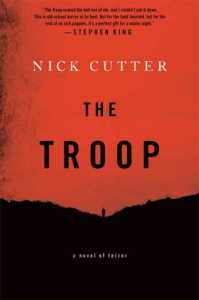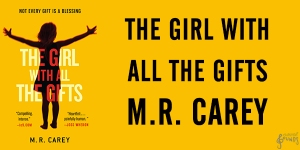In no particular order, the following books published in 2014 are the ones that have moved me, excited me or inspired me in some way. The stand-outs amongst many, so I make apologies for the following notable exceptions (as those authors are going to be desperately upset they didn’t make an arbitrary list on a nobody’s blog.)
‘The Ice Palace‘ Tarjei Vesaas (1963), ‘Niceville‘ Carsten Stroud (2012) ‘The Silence of the Sea‘, Yrsa Sigurdadottir (2011) ‘Under the Skin‘ Michael Faber (2000) and everything by Gillian Flynn (including the magnificent screenplay of ‘Gone Girl’.
Should my opinion on books mean anything whatsoever to you (why it would is anyone’s guess), please read on…
When Stephen King recommends a book, it’s hard for a fan of horror not to be intrigued. I have to also say that without King’s recommendation, I would never have heard of this, so saturated the horror market has become by tired zombie stories and ‘erotic’ vampire novels. Cutter’s story of a scout troop abandoned on an island with something terrible is pleasantly original without being wary of a b-movie style ‘scare’. The Troop is one of those stories you find yourself drawn instantly into its midst; the characterisation is rich and the guts and gore don’t feel gratuitous or unnecessary. I don’t want to spoil anyone’s enjoyment of what happens to Cutter’s scout troop; but those looking for a contemporary and fresh voice in the genre couldn’t do much better than this.
There have been comparisons drawn with Lord of the Flies and whilst The Troop shares some of the themes of Golding (boys abandoned on an island, power struggles in a group dynamic), this is where the comparison ends. The Troop, as is described by Stephen King is old-school style horror and unashamedly so.
What sets The Troop apart from its contemporaries, however, is its strength in characterisation. When you care about the characters in a book; the implausibility of their situation matters less than how they deal with it. I found myself easily immersed in this novel; allowing myself ‘one more chapter’ before I stopped, as tea remained uncooked and washing remained unfolded. That’s got to be a good sign!
Broken Monsters – Lauren Beukes
What can I say? This could possibly be my favourite book of 2014. Lauren Beukes, author of ‘The Shining Girls’, a best-selling crime-noir about a time-shifting serial killer (Dr. Who with an story worth following?) but with Broken Monsters, Beukes takes us to a whole new level of gritty reality. In the exhaust-clogged, shell of Detroit City, Detective Gabriella Versado is called to the scene of what the police are calling ‘Bambi’, a dead boy whose top half has been fused to the hind quarters of a fawn. This is just the beginning of Versado’s terrible pursuit of a serial killer who believes they can find the thin place between the worlds in the realisation of their dream; carving their victims into hideous parodies of underground art.
Much of the narrative is told through the online world form; Reddit posts, Tumblr, text and social media. It’s an ultra-smart and contemporary way to portray not only the younger generation, but the huge part streaming news and social media plays in our lives that Beukes pulls off with aplomb. If traditionally told stories is your thing, I don’t expect this novel will appeal.
Beukes pulls no punches and there is gore and grimness aplenty but splatterpunk this aint. This is a dark tale told with no glamour yet ultimately one of the most exciting crime publications of 2014. Beukes’ sparse use of the paranormal will, no doubt polarise the opinions of those who like their crime noir ‘pure’, however, this side of the story is sparse, lending just enough to accentuate an already gloomy premise.
The plot itself is an intelligent crime story that’s intrigue does not abate. Reading Broken Monsters, I found myself having to put it down as I was enjoying it that much and didn’t want it to end too quickly.
The Girl With All the Gifts – MR Carey
If there’s a theme in contemporary fiction that’s been done to death; done so much to death that its bloated corpse is palpably shuddering with every half-hearted thud of a spade blade on its shattered coffin lid, it’s the zombie apocalypse. Even the idea of ‘zombies’ as ruthless and predatory ‘infected’ rather than the shambling figure of Haitian folklore is a weary cliché we’ve all seen a million times.
By all accounts, therefore, The Girl with all the Gifts should be one to avoided like the plague (see what I did there?) but making an assumption like that (which I very nearly did) is a big mistake to make.
M.R. Carey’s 2014 novel, though dealing with the last survivors of a global pandemic, a deadly fungal virus (Ophiocordyceps unilateralis –that’s the one that makes ants climb to the top of plants to be eaten by predators, as if you didn’t know!) which turns humans to flesh-eating ‘hungries’, feels fresh, despite itself.
In fact, the concept in essence is remarkably similar to the equally enthralling game, Naughty Dog’s 2013 ‘The Last of Us’. Coincidence? To be honest, it really doesn’t matter and to be fair, this genre has limited options.
The Girl with all the Gifts’ style is immediately accessible and grasps the reader from the start with cold, dead fingers. Rather than extensive exposition and philosophising on the end of the world as we know it; Carey’s narrative fluctuates between just a few characters – Melanie, a small girl who spends her days (when she is not muzzled and restrained) at school; Melanie’s teacher, Miss Justineau; Sergeant Parks and scientist Caroline Caldwell. It is the relationship between these four that drives the novel forward. Melanie and Miss Justinaeu’s pseudo parent-daughter dynamic is instantly relatable and in such tragic circumstances establishes itself as the heart of the novel from the beginning. The two others by contrast represent the ‘establishment’; they that dehumanise the ‘infected’ and think nothing of destroying them or indeed locking up 10 year old children for scientific research into a cure.
This is a human story rather than a ‘zombie’ one as such. While the scientist would like to literally delve inside Melanie’s brains, the teacher recognises her as a person in her own right. This tension as the four of them escape from Sergeant Parks’ base that the ‘hungries’ have overrun is the crux of the story and such strongly established characterization carries the reader all the way to the superbly bleak ending.
Another fresh voice in the horror genre, Bird Box tells a highly original tale of the end of days; something has happened in the world, people are boarding up their windows, people are wearing blindfolds, people are killing themselves, killing each other.
They have all seen something.
When Malorie’s sister looks out of the window and kills herself, Malorie is alone. Pregnant and desperate, she answers an ad in a newspaper; sanctuary.
The strength of this story is it is largely told in the dark; the characters wear blindfolds at all times; their skin becomes sallow, their only sight is the gloom of the inside of the house. Malerman never makes this darkness seem clunky or awkward; in fact, the tension created by the inability of the characters to see is this story’s strength. The reader is desperate to know what could possibly be out there, yet at the same time you desperately don’t. More often than not, the things that scare us the most are the things we cannot see; an homage to Lovecraft’s idea of sights that are simply too much for the frailty of the human mind.
And there emerges the question of whether an already warped mind can be immune to the terror.
This atmosphere in Bird Box is palpable from beginning to end and that’s before you even consider its originality in terms of story. I found myself having to take breathers from this novel, such was the tension and that’s in no way a criticism. Tension, atmosphere and originality; all welcome elements of a triumphant horror novel.
Horror has never been a ‘cool’ genre but Bird Box is undoubtedly that slick kid with the leather jacket and the brylcreem who you want to offer a light, even though you don’t smoke. There’s a lot to be said for having the brevity to leave the reader to imagine what is too horrible to even imagine and believe me, there’s no ‘Night of the Demon’-esque let down here.
The end of days is a recurrent theme in much dark fiction and a tired one at that. With Bird Box, Josh Malerman managed to make it cool again.




